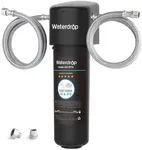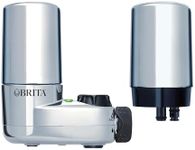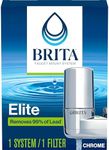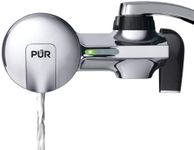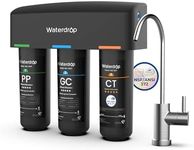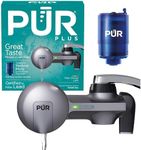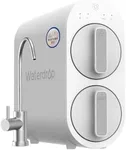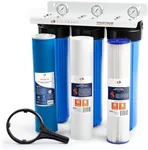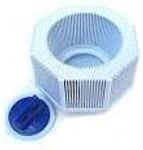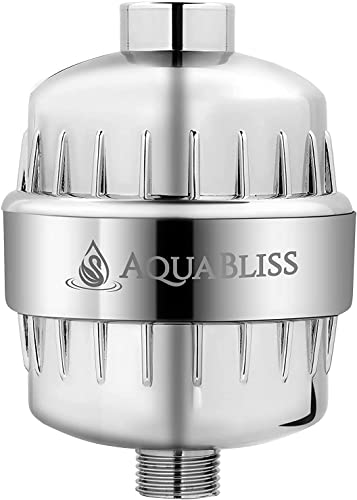Buying Guide for the Best Tap Filter For Hard Water
Choosing the right tap filter for hard water can significantly improve the quality of your drinking water and protect your appliances from scale buildup. Hard water contains high levels of minerals like calcium and magnesium, which can cause various issues. A good tap filter can help reduce these minerals, making your water safer and more pleasant to use. Here are some key specifications to consider when selecting a tap filter for hard water, along with explanations to help you make an informed decision.Filtration TechnologyFiltration technology refers to the method used by the filter to remove impurities from the water. This is important because different technologies target different contaminants. Common types include activated carbon, reverse osmosis, and ion exchange. Activated carbon is good for removing chlorine and organic compounds, reverse osmosis is effective for a wide range of contaminants including heavy metals, and ion exchange is specifically good for reducing hardness by replacing calcium and magnesium ions with sodium or potassium ions. Choose the technology based on the specific contaminants you want to remove and the level of hardness in your water.
Flow RateFlow rate is the amount of water that can pass through the filter in a given time, usually measured in liters per minute. This is important because it affects how quickly you can get filtered water. Higher flow rates are more convenient for busy households but may not filter as thoroughly. Lower flow rates ensure better filtration but can be slower. If you have a large family or use a lot of water, a higher flow rate might be more suitable. For smaller households or if you prioritize thorough filtration, a lower flow rate could be better.
Filter LifespanFilter lifespan indicates how long the filter will last before it needs to be replaced, usually measured in liters of water filtered or months of use. This is important for maintenance and cost considerations. Longer lifespans mean less frequent replacements and lower long-term costs. However, filters with longer lifespans may be more expensive upfront. Consider your water usage and how often you are willing to replace the filter. For heavy usage, a longer lifespan is more convenient. For occasional use, a shorter lifespan might be sufficient.
CertificationCertification refers to the endorsements by recognized standards organizations like NSF or WQA. This is important because it ensures the filter has been tested and proven to effectively remove specific contaminants. Certified filters provide an extra level of assurance about their performance and safety. Look for filters with certifications relevant to your needs, such as those for reducing hardness, removing chlorine, or eliminating heavy metals. Certification can be a good indicator of quality and reliability.
Installation and CompatibilityInstallation and compatibility refer to how easy it is to install the filter and whether it fits your existing tap. This is important for convenience and ensuring you can use the filter without needing additional modifications. Some filters are designed for easy DIY installation, while others may require professional help. Check the compatibility with your tap type and consider how comfortable you are with installation. If you prefer a hassle-free setup, look for filters that are easy to install and come with clear instructions.
Maintenance RequirementsMaintenance requirements include the tasks needed to keep the filter working effectively, such as cleaning and replacing parts. This is important for ensuring the filter continues to perform well over time. Some filters require regular cleaning or part replacements, while others are more low-maintenance. Consider how much time and effort you are willing to invest in maintenance. If you prefer minimal upkeep, look for filters with low maintenance requirements. If you don't mind regular maintenance, you might have more options to choose from.
